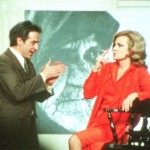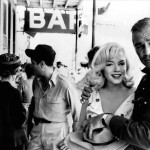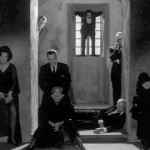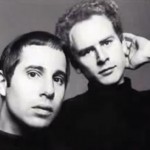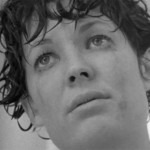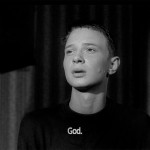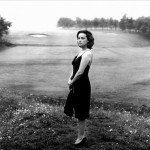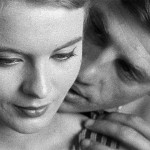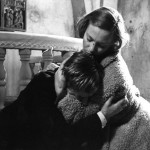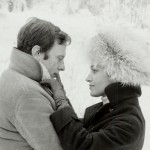This essay was originally published at Senses of Cinema.
– – –
“I was born in Ogden, Utah, the last of four children. Mom and Dad divorced when I was five or six. Dad killed himself when I was 12. I struggled toward growing up, like others, totally confused. Married and divorced twice before I made it to 21. Hitchhiked to Los Angeles when I was 17. Had about 50 or 60 jobs up to the time I was working as a Multilith operator at good old Republic Studios.”
– Hal Ashby
The temptation, when writing about American filmmaker Hal Ashby, is to reduce his life and career to any of a number of ready-made, Hollywood formulae: the small-town boy done good who works his way up from the studio mailroom to the Academy Awards stage; the 1960s free spirit who champions individual rights in a world of oppressive authority and takes his fair share of lumps in the process; the cautionary tale of regrettable indulgences and falls from grace. Unfortunately, the relative dearth of critical and biographical writing currently available about Ashby makes such a trap unavoidable. This, despite the awards, the misty paeans from his collaborators and, most importantly, that amazing streak of films in the 1970s, a streak that rivals those of his more famous contemporaries, Francis Ford Coppola and Robert Altman. With The Landlord (1970), Harold and Maude (1971), The Last Detail (1973), Shampoo (1975), Bound for Glory (1976), Coming Home (1978) and Being There (1979), Ashby proved himself a prodigious talent. That he disappeared behind a string of disappointing pictures in the 1980s and died before redeeming his reputation has led many critics of the Hollywood Film Renaissance to dismiss Ashby as a filmmaker who lacked a coherent voice or who was simply the competent beneficiary of remarkable collaborations. This essay will, I hope, become part of a larger critical reappraisal of Ashby’s films, for they document, with equal parts grace and polemic, a moment in America’s history that was defined by precisely that dichotomy.
No biographer has yet made a subject of Hal Ashby, which is surprising considering the quality and influence of his films and the dramatic circumstances of his life. Soon after discovering his father’s body at the age of twelve, Ashby dropped out of school and began working odd jobs; by seventeen he had already been married and divorced (the first of his four failed marriages). According to Peter Biskind, whose Easy Riders, Raging Bulls offers the only readily-available discussion of Ashby’s life, the young Mormon decided in 1950 to leave the cold winters of Utah and Wyoming behind and to head off for the golden skies of California (1). After arriving in Los Angeles, and after three hungry weeks of fruitless efforts there, Ashby visited the California Board of Unemployment and requested a job at a film studio. He was sent first to Universal, where he worked in the mailroom, but by 1951 he had become an apprentice editor at Republic. He later moved on to Disney and then to Metro, where he met Jack Nicholson, then an aspiring unknown.
Ashby’s film school was the editing room. “It’s the perfect place to examine everything,” he told Michael Shedlin. “Everything is channelled down into that strip of film, from the writing to how it’s staged, to the director and the actors. And you have the chance to run it back and forth a lot of times, and ask questions of it – Why do I like this? Why don’t I like this?” (2) After working as assistant editor under Robert Swink on William Wyler’s Friendly Persuasion (1956) and The Big Country (1958) and George Stevens’ The Diary of Anne Frank (1959) and The Greatest Story Ever Told (1965), Ashby began to gain attention for his own cutting of films by Tony Richardson (The Loved One [1965]) and Norman Jewison. Ashby and Jewison would collaborate on four films: The Cincinnati Kid (1965), The Russians Are Coming, the Russians Are Coming (1966), In the Heat of the Night (1967), for which Ashby won a Best Editing Oscar, and The Thomas Crown Affair (1968). It was Jewison, also, who recommended his friend to direct The Landlord, a project under development at United Artists. Thus Hal Ashby came to make his first film at the age of 40. “If I had it all to do over again, I would rather go at it a different way,” he later said. And, predicting the generation of young American filmmakers who would emerge in the 1970s, he then added: “I say, Good Lord, go out and somehow raise the money to make your own projects. It’s not easy, by any means, but the potential is there for becoming just as good a filmmaker in a much shorter time. I feel very strongly about this” (3).
The Landlord is an outrageous debut, a film that, 34 years later, still feels daring, both stylistically and politically. Beau Bridges plays Elgar Enders, who at 29 leaves his opulent family estate and buys a row house in a New York City ghetto. His plan is to remodel the home once he has evicted its tenants, including Marge (Pearl Bailey), Mr. and Mrs. Copee (Louis Gossett Jr. and Diana Sands) and Professor Duboise (Melvin Stewart). When we first meet Elgar, he is reclining on a lawn chair, sipping brandy. He looks directly into the camera and tells us: “It’s just that I get the feeling that we’re all – I mean everybody, black, white, yellow, Democrats, Communists, Republicans, old people, young people, whatever – we’re all like a bunch of ants, see. See, the strongest drive we have as a true life force is to gain territory.” All of his preconceptions and values – racial, political, economic and otherwise – are tested, though, once his life becomes entwined with those of his tenants. Ashby’s skills as an editor, now freed by his creative control over the picture, are on display from the opening moments, as he crosscuts between high contrast footage of a racquetball game and the softer, more natural tones of the African-American neighbourhood, a visual motif that continues throughout the film. That divide between the white world and the black is heightened also by Ashby’s treatment of his characters: the Enders he turns into absurd and often hilarious caricatures; the tenants are afforded greater sympathy. The end result is an often brilliant, occasionally uneven film that (ridiculous as this might sound) resembles late Buñuel’s attempt at a blaxploitation film.
Capsule reviews of The Landlord typically describe it as a bildungsroman in which an emotionally stunted white man comes of age through his first-hand encounter with the realities of African-American life. Elgar “grows fond” of his tenants, such reviews claim and, by witnessing his blossoming romance with a woman of mixed race, viewers are to learn something about the possibilities of racial reconciliation in America. What we actually learn, though, is just the opposite. Ashby’s film plays like the cinematic equivalent of Radical Chic, Thomas Wolfe’s 1970 account of a fundraiser for the Black Panthers held in the well-heeled home of Felicia and Leonard Bernstein. Like the “limousine liberals” who gathered there on Park Avenue to sip wine, write cheques and discuss – in the measured tones of the New York Review of Books – the “race problem”, Elgar is unprepared for the messy radicalism that greets and, even more significantly, that excludes him. “See, children? Some people can’t learn what we learn,” Professor Duboise tells a room full of students who are already well versed in the rhetoric of Black Power. Ashby captures this tension in a brilliant sequence near the end of the film, when Copee, who is threatening Elgar with an axe after learning that his wife is carrying Elgar’s child, stops and slowly lowers his weapon. Rather than turning his attention to the film’s protagonist, however, Ashby instead stays in a tight shot on Copee, and we’re made suddenly aware that the film has been his story all along. The white, liberal audiences that watch The Landlord root for Elgar because, like him, they (we) believe that their idealism and distant sympathies can somehow make the world “colour blind”. By forcefully shifting the film’s perspective from Elgar’s to Copee’s, Ashby reveals just how naive and politically charged such a position really is.
Ashby inherited his second feature project, Harold and Maude, when executives at Paramount decided that Colin Higgins was too green for the job. Higgins, who wrote the screenplay while still a film student, had hoped to direct the picture himself but acknowledged that the project was never really his to lose. “I was going to make a half-million dollar film and they wanted to make a million-and-a-half dollar film,” he told Shedlin (4). The thematic similarities between The Landlord and Higgins’ script made Ashby a logical, if somewhat risky, choice for the studio. The story of a twenty-year-old rich kid who learns to love life through his encounter with a woman sixty years his senior, Harold and Maude delights in everyday transgressions: uprooting trees from manicured suburban streets and returning them to the forest; parading a yellow umbrella past the dark faces of a funeral line; flipping a bird to repressive authority figures, whether they be mothers, priests, psychiatrists, soldiers or highway patrolmen. That the film manages to do so without surrendering to the carpe diem-like sentiment that has made a respected actor of Robin Williams is testament to the fine performances of its leads, Bud Cort and Ruth Gordon, but also to Ashby’s deft direction, which transforms Higgins’ dark satire into a Brothers Grimm fable (mixed, perhaps, with a Charles Addams drawing or two). As with fairy tale, the moral of Harold and Maude is ultimately less important than the telling of the tale itself. The pure joy of Ashby’s story-telling frees the film to transcend its often banal symbolism and preachy didacticism, creating a filmed world that, like that of Wes Anderson, Ashby’s most gifted disciple, allows for the possibility of grace and childhood wonder in a fallen, cynical, adult world.
And Ashby’s is, most certainly, an adult world. When, two-thirds of the way through the film, we learn that Maude is a Holocaust survivor – and we learn this only from a wordless, one-second shot of the identification tattoo on her forearm – the context within which the film is operating suddenly blossoms to include not only Nixon’s America but all of the impossibly tragic 20th century. Like Walter Benjamin who, in his famous description of Paul Klee’s “Angelus Novus” imagines the angel of history propelled irresistibly forward by the storm of progress “while the pile of debris before him grows skyward”, Harold and Maude demands that viewers experience a glimpse of hope despite the tragedies of the past (5). Ashby accomplishes this to best effect in the final sequence, in which he dismantles and intercuts three events: Harold and Maude’s arrival at the hospital, Harold’s agonising wait for news of her death, and his high-speed drive up the California coastline. Accompanied only by Cat Stevens’ song “Trouble” and by the roaring engine of Harold’s Jaguar-cum-hearse, the sequence is marked by a tragic inevitability. There’s no question of Maude’s survival, no possibility that this dark fable will be appended with a Disney ending and yet, despite the sadness, Harold walks away in the end strumming his banjo, and the film is rescued from the nihilism of its day.
Ashby’s follow-up is less optimistic. In The Last Detail, “Badass” Buddusky (Jack Nicholson) and “Mule” Mulhall (Otis Young), two Navy “lifers”, are chosen to escort Larry Meadows (Randy Quaid) from Norfolk, Virginia to the Portsmouth Naval Prison in New Hampshire. Only 18 years old, Meadows has been court-martialled and sentenced to eight years for attempting to steal $40 from the base’s polio charity. Badass and Mule intend to deliver their prisoner as quickly as possible and spend their per diems and remaining leave in New York City, but they’re soon charmed by the young Meadows and become increasingly troubled by their mission. Written and produced during the dark, closing days of the Vietnam War, The Last Detail employs the picaresque structure of the standard World War II-era service comedy but undercuts its cliched devices at every turn. When a drunken Badass attempts to teach Meadows to be a signalman, for instance, Ashby drowns their dialogue (and much of the scene’s potential humour) in the sounds of gunfire and explosions emanating from the war film playing on the hotel room television. It’s an ironic reminder of the “good war” that precipitated America’s disastrous involvement in Southeast Asia and that helped to define masculinity and heroism for men of Badass and Mule’s generation. Those definitions are repeatedly called into question throughout the film: Badass’ attempts to seduce a young hippy (Nancy Allen) with his anachronistic tales of military adventure fall flat; Mule’s justification for his tour in Vietnam – “Gotta do what the Man says” – is less noble service than mindless obedience; Meadows’ first trip to a whorehouse ends with the most premature of ejaculations. When Badass and Mule do finally hand Meadows over to authorities at Portsmouth, they head home spouting their hatred for this “motherfucking chickenshit detail,” but there’s little doubt that the home they’re heading back to is in Norfolk. Unlike the wealthy Elgar and Harold, these blue-collar warriors have no other options.
The standard critical line on The Last Detail is that its many and obvious merits are attributable, first and foremost, to the quality of Ashby’s collaborators, Nicholson and screenwriter Robert Towne chief among them. Towne certainly deserves much credit, both here and in his next teaming with Ashby on Shampoo, but the film soars on the strength of Ashby’s direction, and particularly on his restraint of Nicholson. By casting 6’4” Quaid and 6’2” Young in the supporting roles, Ashby turns Badass into an embodiment of aggressive overcompensation; Nicholson has never looked so small or his shtick so impotent. And when the actor does launch into full-on “Jack” mode – as when he trashes their motel room in a vain effort to rouse Meadows’ anger – Ashby refuses to allow Nicholson’s persona to subsume the character. Instead, he cuts abruptly to a quiet moment of Badass and the young seaman together on the edge of the bed, now bored and contained. Such a jumpcut works here only because Ashby’s verite approach with actors and with the staging of key sequences, an approach employed to even greater effect in Coming Home, allows room for freedom and improvisation. That so many actors – Quaid and Young, but also Cort, Gordon, Lee Grant, David Carradine, Peter Sellers, Jack Warden and Bruce Dern, among others – delivered arguably the best performances of their careers in Ashby films is perhaps the finest testament to his gifts as an actor’s director.
As with The Last Detail, Ashby is often treated by his critics as merely a hired gun for his work on Shampoo, offering competent but unexceptional direction in what is essentially a Robert Towne and Warren Beatty picture. Beatty stars as George Roundy, a hip Hollywood hairdresser whose reputation is built as much on his prowess in the bedroom as in the salon. As the film begins he’s torn between three women: his girlfriend Jill (Goldie Hawn), his ex Jackie (Julie Christie) and Felicia (Grant), a client whose wealthy husband Lester (Warden) holds the purse strings to George’s dream of owning his own salon. When all five characters attend the same election night party, Shampoo collapses quickly into a sexual farce straight from the Restoration stage. But the film is seldom laugh out loud funny. Instead, Shampoo plays like a melancholy answer to The Graduate – complete with original Paul Simon music – except that Ben is now no longer fucking just Mrs. Robinson and Elaine, but also every other bored, vain housewife in the neighbourhood. The youthful naiveté and reckless adventure that mark those final, iconic moments of The Graduate have been replaced by disillusionment, pathetic posturing and moral apathy. When George tells Jackie, “I don’t fuck anybody for money, I do it for fun,” he’s accusing her of whoring herself to Lester, but he’s also deluding himself. George is the biggest whore of the lot, and he pays the highest price for it.
Of the films he made in the ’70s, Shampoo feels the least like a Hal Ashby picture. It’s too restrained, too closely bound to the tight structuring of Towne and Beatty’s remarkable screenplay. At times, there is also an uncharacteristic staginess to the blocking of actors, as in the first scene between Christie and Warden, where they move unnaturally around Lester’s office, self-consciously hitting their marks in synch with the choreographed movements of the camera. Ashby’s films come alive, instead, when his actors are allowed room to move, as when George flies into a rage outside of a bank that has just denied him a loan. Here, Ashby shoots Beatty in an extreme long shot, watching silently from across the parking lot as the actor rips off his jacket and tie and throws them both into a trashcan.
Such long shots are a trademark of Ashby’s films: Elgar standing in the street with his child in his arms, Maude’s introduction at the first funeral, Badass and Mule wrestling Meadows to the ground, Bob undressing at the beach in Coming Home, Chance walking off across the water in Being There. The extreme long shot serves, for Ashby, the same function that the close-up does for many filmmakers – heightening emotion at critical moments in the narrative – but it does so without forcing a shift to a particular character’s subjective perspective (Ashby, in fact, very seldom cuts on an eyeline match). We remain always detached observers, judging and, occasionally, sympathising with characters, but never coming to see the world exclusively through their eyes. Shampoo also makes effective use of popular music, another Ashby trademark. Except for the Paul Simon song, which returns like a Greek chorus five times in the film, the only other non-diegetic music is The Beach Boys’ “Wouldn’t It Be Nice?” which plays over the opening scene and returns again for the closing credits. Released in 1975, within months of Nixon’s resignation, and set seven years earlier on the day he was first elected, Shampoo is an elegy to the wasted potential of America’s cultural revolution. “Wouldn’t It Be Nice?” is wistful nostalgia, as ironic as the final words we hear uttered by the President-Elect on George’s television: “A teenager held up a sign that said ‘Bring Us Together,’ and that will be the great objective of this administration at the outset. To bring the American people together.”
While Shampoo is, at times, stylistically different from Ashby’s other pictures of the era, it continues his investigation of the theme that most dominates his work – that is, the cost, both literal and metaphoric, of individual freedom and integrity in a world dominated increasingly by oppressive, dehumanising economic interests. Bound for Glory, then, is a logical, if ambitious, next step in that project. A document of four years in the life of folksinger Woody Guthrie – the “dustbowl” years when he was travelling through the southwest, living with and singing to camps of migrant workers – the film is part hagiography, part Waiting for Lefty-like agitprop, part old fashioned Western. Joseph McBride, writing for Film Comment in 1976, called it “a majestic film, the most ambitious film made in the United States since The Godfather Part II, and one of those rare pictures which are made with the lavish resources, meticulous care, and concern for epic breadth that characterize the way the great Hollywood movies used to be made” (6). While McBride might be accused of hyperbole, Bound for Glory remains a remarkable film, and it is an interesting artefact from Hollywood’s Film Renaissance. After the massive commercial success of Shampoo, Ashby had carte blanche for his follow-up, and he used that muscle to rescue the Woody Guthrie project from years of development problems and script rewrites. At a production cost of nearly $10 million and starring David Carradine, then known mostly for the television series Kung Fu and for low budget films like Death Race 2000 (Paul Bartel, 1975), Bound for Glory was a sizeable risk for United Artists. It’s difficult to imagine a studio taking such a gamble at any time other than the mid-1970s, those few years when adventurous filmmaking was still occasionally rewarded at the box office and when studio heads had yet to learn the various lessons of Star Wars (George Lucas, 1977) and Heaven’s Gate (Michael Cimino, 1980).
What is most striking today about Bound for Glory is Haskell Wexler’s photography, which turns Depression-era California into one more of Ashby’s many worlds of the haves and have-nots (7). Los Angeles, with its green lawns and sparkling sheen, couldn’t be more different from the small Texas town where Guthrie begins his voyage and where everything – even the people, it seems – is covered by an inch of dust. Wexler shoots it all in soft, muted tones; the sky is as brown as the desert landscapes through which Woody travels, slowly, for the first third of the film. Like Ashby’s and Wexler’s next collaboration, Coming Home, much of Bound for Glory was filmed with long lenses that pull characters into focus against an impossibly expansive backdrop. When Woody sits down to play his harmonica, for instance, he and his chair appear to float above a desert highway that stretches, in a dead-straight line, from Arizona to the Atlantic. The long lenses also allow Ashby and his crew to stay far-removed from the action, capturing the spontaneous “performances” of his lead actors and his large cast of extras. A two minute montage of such images lends the campground sequences, in particular, a documentary-like feel; Wexler and Ashby would later return to this technique for Coming Home‘s Fourth of July picnic sequence.
In many ways, Coming Home epitomises Hal Ashby’s cinematic style, and it is also his most personal film. The project was conceived by Jane Fonda with the help of screenwriter Nancy Dowd, and was originally intended for John Schlesinger. When he left the project, however, the screenplay was reshaped significantly by the circle of talent who would eventually bring it to the screen: Fonda, Ashby, Wexler, Jon Voigt, producer Jerry Hellman and screenwriters Waldo Salt and Robert Jones. They were united by their opposition to the Vietnam war and by their concern for the veterans who were returning to an America unable or unwilling to reacclimatize them to life back home. Told as a love triangle between a young woman (Fonda), her Marine husband (Dern) and the paralysed vet (Voigt) she meets while he is overseas, Coming Home confronts head-on what had been treated already as a sidebar in Harold and Maude, The Last Detail and Shampoo: the lingering wounds – physical, psychological, emotional and political – from America’s involvement in Vietnam. The film earned Ashby Best Director nominations from the Academy and from the Director’s Guild; Voigt, Fonda and the team of writers won Oscars for their efforts; and Dern, Penelope Milford (as Sally’s friend, Vi), Don Zimmerman (editor) and the film itself were all likewise rewarded with Oscar nominations.
If Coming Home is guilty, at times, of over-earnestness or of slipping into polemic, it is rescued from such potentially fatal missteps by its many fine performances and by the filmmaker’s palpable respect for his characters. Even Dern’s disgraced Bob, a Marine who could so easily have been reduced to a caricature, becomes instead a tragic figure capable of eliciting our deepest sympathies. Dern’s desperate delivery of the line, “What I’m saying is I do not belong in this house!” is one of the most affecting moments in any of Ashby’s films and it encapsulates, in a single breath, the crisis of the dislocated veteran. Ashby and Wexler once again blend dramatic set pieces with documentary style footage, most notably in the opening sequence, when Voigt’s character, Luke, listens quietly as a group of actual, paralysed vets discuss their very real feelings about the war. That same sense of verisimilitude also informs many of the scenes between the lead actors, as when Fonda and Voigt stroll down the boardwalk, discussing Bob’s impending return. On the DVD release of Coming Home, Wexler remarks that the scene was shot with an 800 millimetre lens from a distance of more than 400 yards, freeing us, once again, to remain distant and relatively objective observers, and allowing the actors room for spontaneous improvisation. The film’s showpiece, however, comes in its final sequence, when Ashby crosscuts between Luke’s speech to a group of draft-eligible teens, Sally and Vi’s trip to a grocery store, and Bob’s walk into the ocean, all of it accompanied by Tim Buckley’s “Once I Was”. Like the finale of Harold and Maude, this sequence balances tragedy – is Bob swimming off to his death? – with painful progress. Despite the still-lingering wounds of war, Sally’s new-found independence and Luke’s charity suggest that Ashby retains some measure of hope for healing.
The last of Ashby’s signature films is Being There, his adaptation of the Jerzy Kosinski novel. After publishing Being There in 1971, Kosinski swore that he would never allow it or any of his other work to be filmed, but after learning that a movie project was in the early stages of development, and after experiencing first-hand Peter Sellers’ aggressive campaign for the lead role, the author set to work on a screenplay of his own. Ashby’s final product is, by most accounts, a smashing success, both as an adaptation of a much-respected novel and as a film, judged on its own merits. The story of Chance, a simpleton gardener who stumbles into America’s most powerful spheres of influence, Being There is a satiric jab at the co-opting of the nation’s public discourse by television’s empty images and content-free rhetoric. Such ideas were nothing new to Ashby, who had been toying with similar themes in his own work for years. In The Last Detail, Shampoo and Coming Home, in particular, characters are unable to free themselves from the constant barrage of political speeches, commercial advertisements, and reportage that emanate from the televisions, billboards, and radios that seem to have them surrounded. When Sally asks Bob what combat was like, his response echoes the main argument of Being There: “I don’t know what it’s like; I only know what it is. TV shows what it’s like; it sure as hell don’t show what it is.”
For Ashby, the great challenge of Being There was sustaining its absurd premise for two hours without allowing it to slip, even for a moment, into farce. “This is the most delicate film I’ve ever worked with as an editor,” he told Aljean Harmetz. “The balance is just incredible. It could be ruined in a second if you allow it to become too broad. Peter’s character is a sponge. He imitates everything he sees on television and everyone he meets. In one scene, he imitated the voice of a homosexual. It was very funny, but we couldn’t allow it. It would have destroyed the balance” (8). Ashby’s film, like Sellers himself, plays the comedy straight-faced, refusing to rob the character of his allegoric simplicity by making of it little more than a cheap joke. Chance is, instead, the ultimate straight man, a tabula rasa against which his associates’ ridiculous behaviour might be exposed. In the film’s funniest scene, Eve (Shirley MacLaine) – the wealthy, sex-starved woman who first tempts Chance into the world of earthly delights – tries to seduce her guest while he watches a passionate romance on television. When the program ends, however, Chance is no longer able to imitate the “appropriate” behaviour and so he flips the channel, leaving Eve confused and frustrated. “I like to watch,” he tells her, which sends Eve to the floor, where she masturbates to climax. Ashby builds additional layers of commentary and humour onto the scene by having Chance flip to an aerobics program, whose instructor encourages viewers to “explore slowly.” By the end of the scene, Eve is panting on the floor, unaware that Chance is standing on his head, just like the woman on television. Self-indulgence and superficiality have never seemed more absurd.
Being Thereis a strangely fitting conclusion to Ashby’s enviable run during the 1970s. Commenting on Kosinski’s prescient novel, Barbara Tepa Lupack writes, “while Kosinski did not live to witness the Chance-like candidacy of H. Ross Perot, conducted largely via television time purchased with his own millions, he surely must have appreciated the irony of actor Ronald Reagan’s two telegenic terms in office as well as understudy George Bush’s subsequent lacklustre performance in the White House” (9). Ashby’s career, like those of so many of his contemporaries, was derailed by sweeping changes in Washington, D.C., in Hollywood and in America at large. The studios, now on the lookout for blockbuster box office returns and wary of signing over creative control to “cost no object” directors, turned their attention away from smaller, more personal films like Ashby’s. Reagan’s America likewise awoke to a “new morning”, conveniently ignoring the traumatic events that had defined the previous decades. For Ashby, who had embodied the country’s counter-cultural spirit in thought and deed, the “Me Decade” must have been catastrophically disheartening. In an era of conservative piety and institutionalised greed, Ashby’s politically motivated irreverence and his simple faith in humanity’s potential for radical change were suddenly an anachronism.
Ashby finished his career with a string of largely forgotten films. He reunited with Haskell Wexler for the first two: Second-Hand Hearts (1981), starring Robert Blake and Barbara Harris, and Lookin’ to Get Out (1982), a character study of two gamblers written by and starring Jon Voigt. Like the rest of Ashby’s final work (and The Landlord), neither is currently available on any home video format. He also directed Let’s Spend the Night Together (1982), a by-the-books document of the Rolling Stones’ 1981 tour, and followed it with The Slugger’s Wife (1985), an irredeemably bad translation of Neil Simon’s abysmal screenplay (10). The poor quality of the film is frequently attributed to Ashby’s growing dependence on drugs and alcohol, which had precipitated a physical collapse during the Stones’ tour. Because of his increasingly unreliable behaviour, films were taken from him during post-production and given to others for final editing. Ashby’s final feature, 8 Million Ways to Die (1986), however, marked something of a return to form for the director. An adaptation of Lawrence Block’s popular detective novel, the film is an entertaining piece of film noir, with Jeff Bridges as the hardened ex-cop and Rosanna Arquette as his femme fatale. Though burdened by the stylistic influence of TV’s Miami Vice and by James Newton Howard’s cloying, synthesized score, 8 Million Ways to Die comes to life at surprising moments, particularly in the final act. When Bridges confronts the young drug kingpin, played by Andy Garcia, we are reminded of Ashby’s gifts as a director of actors; they appear to have set aside Oliver Stone’s screenplay and discovered a more palpable energy in their improvisations. Ashby’s final production was Jake’s Journey (1988), a television project developed by ex-Python Graham Chapman. After filming the pilot, both men were prevented by poor health from continuing their collaboration.
Hal Ashby was diagnosed in early-1988 with a cancer that spread rapidly to his liver and colon and to which he succumbed, finally, on December 27. Ashby’s death at 59 prevented him from witnessing the re-birth of independent cinema that energised America’s filmmakers, young and old, during the early-1990s. Imagine how different our appraisals of Robert Altman’s career might be had it ended with Popeye (1980), Come Back to the Five and Dime, Jimmy Dean, Jimmy Dean (1982) and Secret Honor (1984) – had it ended before he made The Player (1992) and Short Cuts (1993). Or, imagine how different our opinion of Francis Ford Coppola might be had he not retreated to his vineyards and re-emerged as an acclaimed producer of others’ films – had his career ended with One from the Heart (1982), The Outsiders (1983), and Rumble Fish (1983). Hal Ashby personifies, better than any other director, Hollywood’s Film Renaissance of the 1970s: its moral ambivalence and political rage, its stylistic audacity and deeply human voice, its supernova of energy that could not possibly burn so brightly for very long.
Endnotes
- Peter Biskind, Easy Riders, Raging Bulls: How the Sex-Drugs-and-Rock ‘N’ Roll Generation Saved Hollywood, New York, Simon, 1998. Unfortunately, because Biskind’s book has become so influential, and because it is (sadly) the only text that devotes more than a few sentences to Ashby, what little we know of the director’s personal life has been reduced to a series of sensational anecdotes. There’s Hal the chain-smoking, hyper-obsessive editor, sitting at his Moviola for twenty-four hours at a stretch; Hal the recluse, holed-up in his beach house, unwilling to talk to anxious producers; Hal the Hollywood rebel, who promised to use his Oscar as a door stop; Hal the drug-addicted depressive, who fought suicidal tendencies throughout his life and whose addictions cost him several high-profile projects in the 1980s.

- Michael Shedlin, review of Harold and Maude, Film Quarterly, vol. 26, no. 1, 1972, p. 53.

- Shedlin, p. 53.

- Shedlin, p. 52.

- Walter Benjamin, Illuminations, New York, Schocken, 1985. p. 285.

- Joseph McBride, “Song for Woody”, Film Comment, November/December 1976, p. 26.

- Wexler, in fact, was fifth in a line of talented young DPs to work with Ashby. He was preceded by Gordon Willis on The Landlord, John Alonzo on Harold and Maude, Michael Chapman on The Last Detail, and László Kovács on Shampoo.

- Quoted in “Chance Encounters: Bringing Being There to the Screen” by Barbara Tepa Lupack in Critical Essays on Jerzy Kosinski, New York, Hall, 1998, p. 214.

- Lupack, p. 213.

- If watching Rebecca DeMornay sing a synthesizer-backed cover of Neil Young’s “My My, Hey Hey (Out of the Blue)” was not the most depressing moment of my film-watching life, then it’s only because I could imagine Ashby enjoying the irony of it all.




